Unit 4 My day Comic strip & Welcome to the unit 知识点课件(共39张PPT)
文档属性
| 名称 | Unit 4 My day Comic strip & Welcome to the unit 知识点课件(共39张PPT) |  | |
| 格式 | pptx | ||
| 文件大小 | 791.7KB | ||
| 资源类型 | 教案 | ||
| 版本资源 | 牛津译林版 | ||
| 科目 | 英语 | ||
| 更新时间 | 2024-06-23 16:04:14 | ||
图片预览

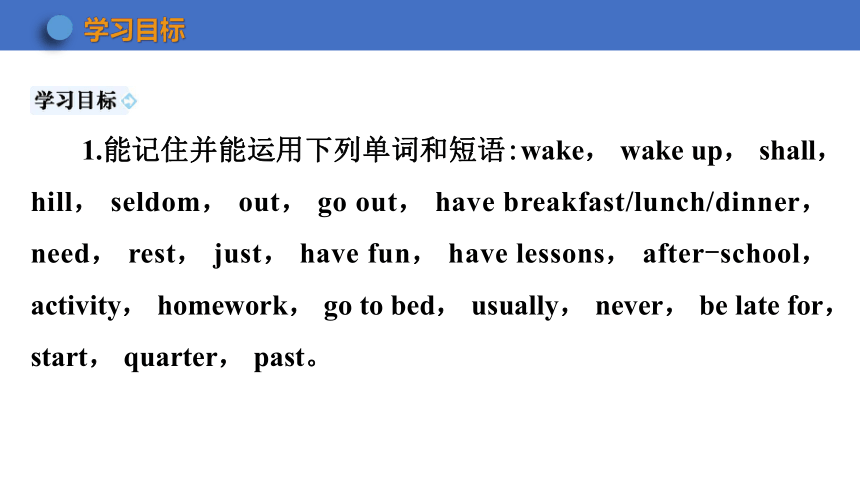
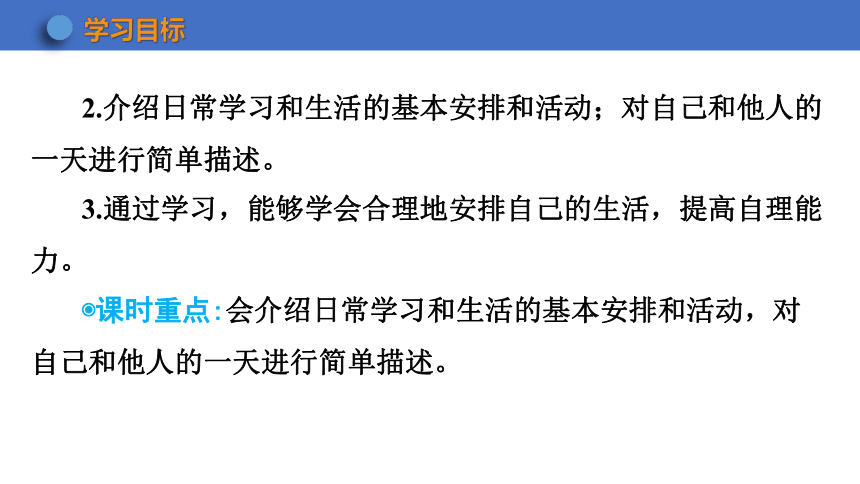

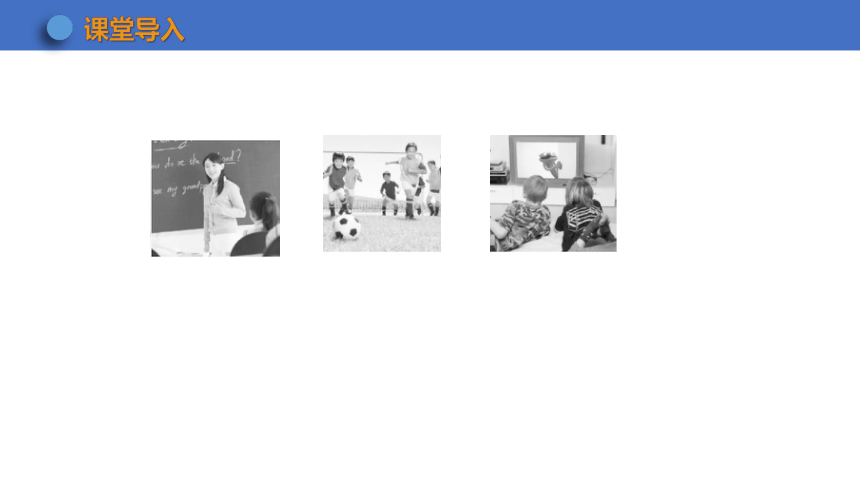
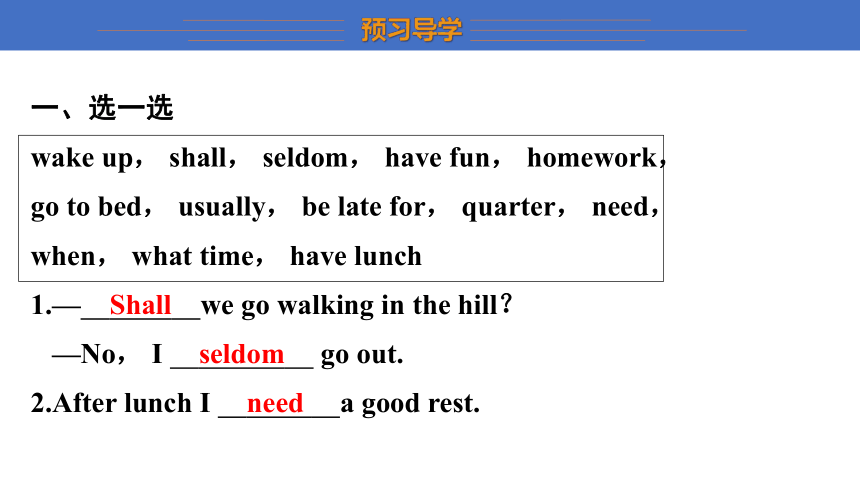

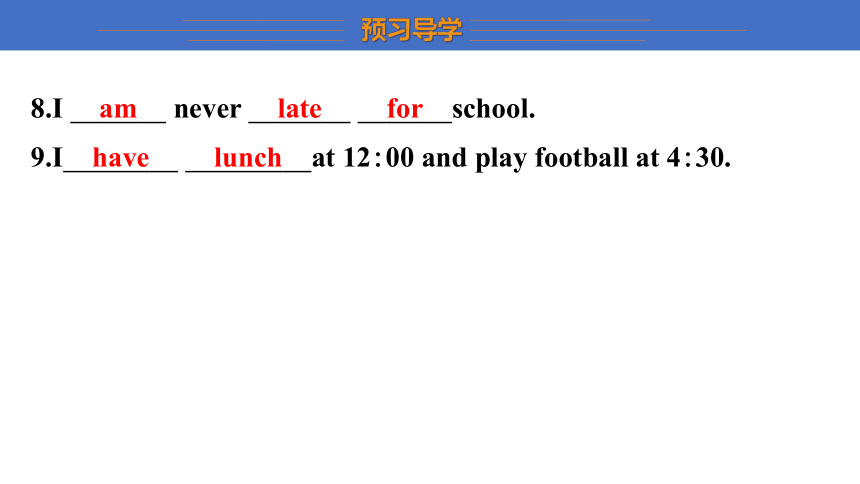
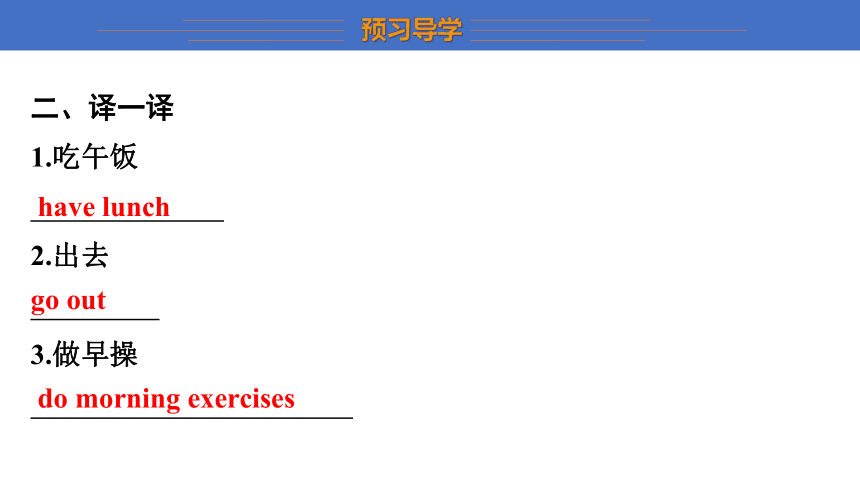
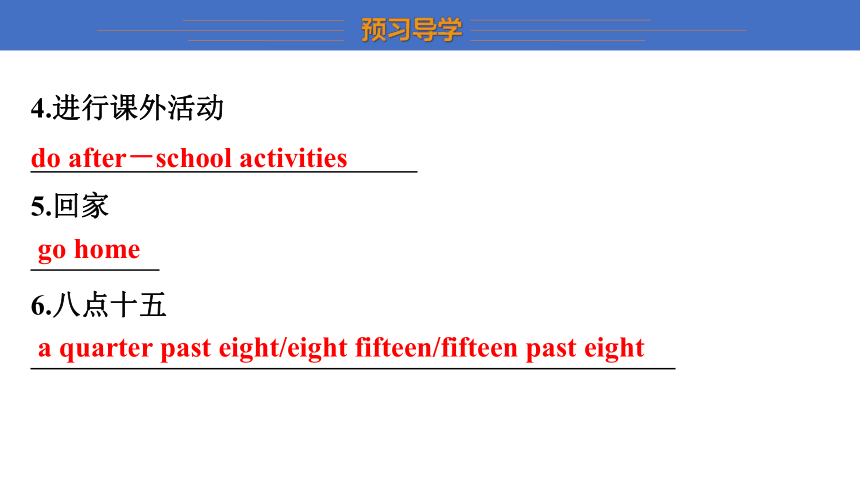
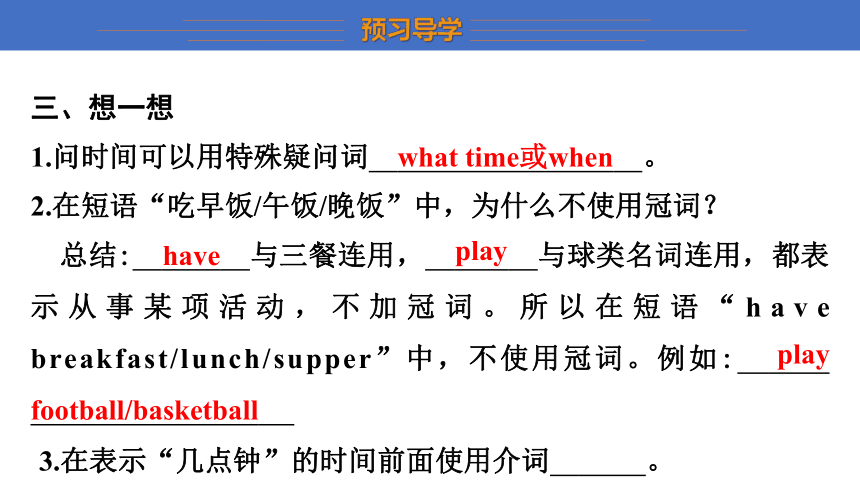
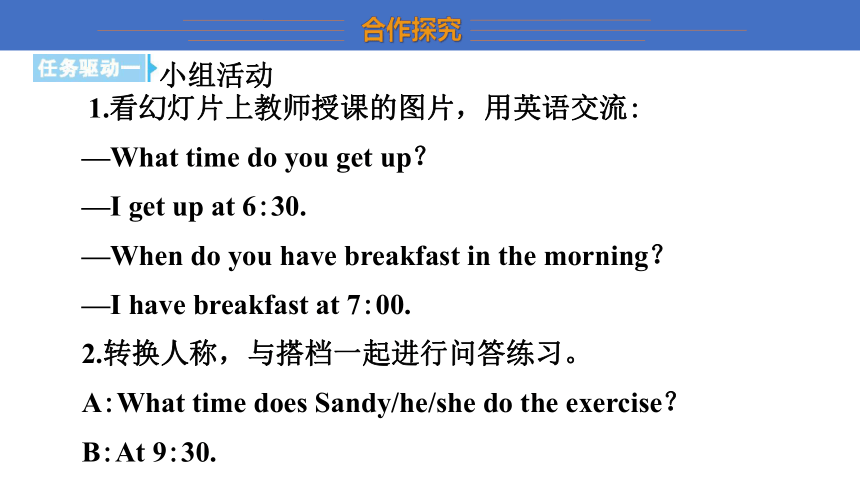
文档简介
(共39张PPT)
七年级·英语·译林版·上册
Unit 4 My day
Comic strip & Welcome to the unit
1.能记住并能运用下列单词和短语:wake, wake up, shall, hill, seldom, out, go out, have breakfast/lunch/dinner, need, rest, just, have fun, have lessons, after-school, activity, homework, go to bed, usually, never, be late for, start, quarter, past。
2.介绍日常学习和生活的基本安排和活动;对自己和他人的一天进行简单描述。
3.通过学习,能够学会合理地安排自己的生活,提高自理能力。
课时重点:会介绍日常学习和生活的基本安排和活动,对自己和他人的一天进行简单描述。
同学们你们觉得忙吗?平时学习时间长、压力大,你们是如何安排一天的学习生活呢?今天我们一起来学习如何合理地安排一天的学习生活。
一、选一选
wake up, shall, seldom, have fun, homework,
go to bed, usually, be late for, quarter, need,
when, what time, have lunch
1.— Shall we go walking in the hill?
—No, I seldom go out.
2.After lunch I need a good rest.
Shall
seldom
need
3.You don’t know how to have fun .
4.— When do you wake up in the morning?
—At 6:30.
5.— What time do you have lessons?
—At 8:00.
6.—When do you usually go to bed ?
—At a quarter past nine.
7.I usually do my homework after supper.
have
fun
When
wake
up
What
time
go
to
bed
quarter
usually
homework
8.I am never late for school.
9.I have lunch at 12:00 and play football at 4:30.
am
late
for
have
lunch
二、译一译
1.吃午饭
have lunch
2.出去
go out
3.做早操
do morning exercises
have lunch
go out
do morning exercises
4.进行课外活动
do after-school activities
5.回家
go home
6.八点十五
a quarter past eight/eight fifteen/fifteen past eight
do after-school activities
go home
a quarter past eight/eight fifteen/fifteen past eight
三、想一想
1.问时间可以用特殊疑问词 what time或when 。
2.在短语“吃早饭/午饭/晚饭”中,为什么不使用冠词?
总结: have 与三餐连用, play 与球类名词连用,都表示从事某项活动,不加冠词。所以在短语“have breakfast/lunch/supper”中,不使用冠词。例如: play football/basketball
what time或when
have
play
play
football/basketball
3.在表示“几点钟”的时间前面使用介词 at 。
1.看幻灯片上教师授课的图片,用英语交流:
—What time do you get up?
—I get up at 6:30.
—When do you have breakfast in the morning?
—I have breakfast at 7:00.
2.转换人称,与搭档一起进行问答练习。
A:What time does Sandy/he/she do the exercise?
B:At 9:30.
小组活动
主语是第三人称单数时,谓语动词要用第三人称单数形式。
1.学习新单词和短语wake, wake up, shall, hill, seldom, out, go out, have breakfast/lunch/dinner, need, rest, just, have fun, have lessons, after-school, activity, homework, go to bed, usually, never, be late for, start, quarter和 past。
角色扮演
2.观看Eddie和Hobo之间的卡通视频,了解Eddie的作息情况。
3.根据卡通内容回答下列问题:
(1)What does Eddie do every day? ( He seldom goes out./He eats and sleeps. )
(2)What does Eddie do after breakfast?( He sleeps and then he has lunch. )
(3)What does Eddie do after lunch?( He needs a good rest. )
He seldom goes
out./He eats and sleeps.
He sleeps and
then he has lunch.
He needs a good
rest.
(4)What about Hobo? ( I guess (猜测) he likes going walking in the hills. )
I guess (猜测) he likes going
walking in the hills.
4.读Eddie和Hobo的对话并分角色扮演。
5.看课本第43页A部分的方框中米莉一天的活动内容,仿照米莉的活动,根据你自身的实际情况完成右栏中你的活动内容。
6.两人一组谈论米莉活动,进行问答练习。可以参考下面的句型:
A:What time does Millie get up?
B:She gets up at....
A:What does Millie do at 7:00 a.m. every day?
B:She has breakfast.
A:How many hours does Millie have lessons every day?
B:About seven hours.
A:Does she go home at 4:00 p.m.?
B:No, she doesn’t.
7.转换人称,把主语换成you,谈论你的活动,再进行问答练习。选择两组同学到全班同学面前展示。
8.听B部分的对话录音,并跟读。
9.再次播放录音,听完后朗读对话,并分角色表演。
如果感觉这些问题不容易回答,可以先在小组内讨论,然后共同给出答案。反复巩固表示活动的短语。
写作活动
1.背诵课本第43页A部分出现的重点短语,最好能够默写下来。
It is sunny today. I would like to go walking . I like sports and I always go walking in the hills . But my friend Eddie is lazy. He seldom does sports. He wakes up very late. And then he wants to have breakfast . After it, he sleeps again. When he finishes his lunch, he says he needs a good rest .
walking
hills
seldom
wakes
up
breakfast
needs
rest
2.完成下面的短文。
Here’s Hobo’s diary.
Oh, my God! His life is eating and sleeping. I think some dogs just don’t know how to have fun .
just
fun
由于短文内容偏难,你可以根据课本内容提示来完成。
●Shall we go walking in the hills? 我们去山上散步好吗?
“Shall we...?”意为“我们……好吗?”,其中 shall为情态动词,用来表示提出或征求建议,其后跟动词原形。注意:表示提建议句型的答语常用“Good idea!”或“That’s a good idea!”例如:
—Shall we go swimming?
—That’s a good idea.
——我们去游泳好吗?
——好主意。
【拓展】提建议句型还有:
1.“Let’s + v. 原形。”例如:
Let’s go swimming. 让我们去游泳吧。
2.“What/How about + v.-ing? ”例如:
What/How about going swimming? 去游泳怎么样?
3.“Why not + v. 原形?”或者“Why don’t we + v. 原形?”例如:
Why not go swimming? = Why don’t we go swimming? 我们为什么不去游泳呢?
单项选择。
( D )1.— we go to help Mrs Wu clean the house?
—Good idea! She will be happy to see us.
A.Do B.Need
C.Must D.Shall
D
( A )2. going to the park this weekend?
A.What about B.Shall we
C.Let’s D.Why not
A
1.“how to have fun”为“疑问词+动词不定式”结构,此结构在句中可以作主语、宾语或表语,此处作know的宾语。例如:
How to get there is a problem. 如何到达那里是个问题。(作主语)
●Some dogs just don’t know how to have fun. 有些狗就是不知道怎样玩乐。
What I want to know is which one to choose.我想知道的是选择哪一个。 (作表语)
Please tell me when to go home.请告诉我什么时候回家。 (作宾语)
2. “have fun”意为“玩得高兴”,此处fun是不可数名词,意为“嬉戏;娱乐;乐趣”,也可作形容词,意为“有趣的”,相当于“interesting”。fun的变式形容词是“funny”,意为“有趣的;可笑的”。意思相近的短语还有“have a good time”和“enjoy oneself”。例如:
We have fun in the park. 我们在公园里玩得很高兴。
【拓展】have fun后接动词时要用v.-ing形式,have fun (in) doing sth意为“做某事很愉快”。例如:
I have fun listening to the teacher in class. 在课上,我听老师讲课听得很愉快。
单项选择。
( B )1.Many people nowadays (现在) don’t know cook meals.
A.what to B.how to
C.how D.to
B
( B )2.We have fun shopping in the supermarket.
A.go B.going
C.goes D.to go
B
●have breakfast 吃早饭
have作为动词,有have和has两种形式,have用于第一、二人称的单数和复数以及第三人称复数,has用于第三人称单数。have的词义多变,主要有以下几种:
1.作“吃”讲时,常与三餐构成动词短语:have breakfast/lunch/supper/dinner,注意中间不用冠词。例如:
Let’s have lunch at school. 让我们在学校里吃午饭吧。
2.作“有”讲。例如:
I have a pen and two pencils. 我有一支钢笔和两只铅笔。
3.作“进行;举行”讲。例如:
We have a sports meet on the playground.我们在操场上举行运动会。
4.作“得(病);患(病)”讲。例如:
—What’s the matter with you?
—I have a cold.
——你怎么了?
——我感冒了。
单项选择。
( D )—Do you have dinner at home?
—Yes. I usually have big dinner with my family at home.
A.the; the B.the; /
C./; / D./; a
D
七年级·英语·译林版·上册
Unit 4 My day
Comic strip & Welcome to the unit
1.能记住并能运用下列单词和短语:wake, wake up, shall, hill, seldom, out, go out, have breakfast/lunch/dinner, need, rest, just, have fun, have lessons, after-school, activity, homework, go to bed, usually, never, be late for, start, quarter, past。
2.介绍日常学习和生活的基本安排和活动;对自己和他人的一天进行简单描述。
3.通过学习,能够学会合理地安排自己的生活,提高自理能力。
课时重点:会介绍日常学习和生活的基本安排和活动,对自己和他人的一天进行简单描述。
同学们你们觉得忙吗?平时学习时间长、压力大,你们是如何安排一天的学习生活呢?今天我们一起来学习如何合理地安排一天的学习生活。
一、选一选
wake up, shall, seldom, have fun, homework,
go to bed, usually, be late for, quarter, need,
when, what time, have lunch
1.— Shall we go walking in the hill?
—No, I seldom go out.
2.After lunch I need a good rest.
Shall
seldom
need
3.You don’t know how to have fun .
4.— When do you wake up in the morning?
—At 6:30.
5.— What time do you have lessons?
—At 8:00.
6.—When do you usually go to bed ?
—At a quarter past nine.
7.I usually do my homework after supper.
have
fun
When
wake
up
What
time
go
to
bed
quarter
usually
homework
8.I am never late for school.
9.I have lunch at 12:00 and play football at 4:30.
am
late
for
have
lunch
二、译一译
1.吃午饭
have lunch
2.出去
go out
3.做早操
do morning exercises
have lunch
go out
do morning exercises
4.进行课外活动
do after-school activities
5.回家
go home
6.八点十五
a quarter past eight/eight fifteen/fifteen past eight
do after-school activities
go home
a quarter past eight/eight fifteen/fifteen past eight
三、想一想
1.问时间可以用特殊疑问词 what time或when 。
2.在短语“吃早饭/午饭/晚饭”中,为什么不使用冠词?
总结: have 与三餐连用, play 与球类名词连用,都表示从事某项活动,不加冠词。所以在短语“have breakfast/lunch/supper”中,不使用冠词。例如: play football/basketball
what time或when
have
play
play
football/basketball
3.在表示“几点钟”的时间前面使用介词 at 。
1.看幻灯片上教师授课的图片,用英语交流:
—What time do you get up?
—I get up at 6:30.
—When do you have breakfast in the morning?
—I have breakfast at 7:00.
2.转换人称,与搭档一起进行问答练习。
A:What time does Sandy/he/she do the exercise?
B:At 9:30.
小组活动
主语是第三人称单数时,谓语动词要用第三人称单数形式。
1.学习新单词和短语wake, wake up, shall, hill, seldom, out, go out, have breakfast/lunch/dinner, need, rest, just, have fun, have lessons, after-school, activity, homework, go to bed, usually, never, be late for, start, quarter和 past。
角色扮演
2.观看Eddie和Hobo之间的卡通视频,了解Eddie的作息情况。
3.根据卡通内容回答下列问题:
(1)What does Eddie do every day? ( He seldom goes out./He eats and sleeps. )
(2)What does Eddie do after breakfast?( He sleeps and then he has lunch. )
(3)What does Eddie do after lunch?( He needs a good rest. )
He seldom goes
out./He eats and sleeps.
He sleeps and
then he has lunch.
He needs a good
rest.
(4)What about Hobo? ( I guess (猜测) he likes going walking in the hills. )
I guess (猜测) he likes going
walking in the hills.
4.读Eddie和Hobo的对话并分角色扮演。
5.看课本第43页A部分的方框中米莉一天的活动内容,仿照米莉的活动,根据你自身的实际情况完成右栏中你的活动内容。
6.两人一组谈论米莉活动,进行问答练习。可以参考下面的句型:
A:What time does Millie get up?
B:She gets up at....
A:What does Millie do at 7:00 a.m. every day?
B:She has breakfast.
A:How many hours does Millie have lessons every day?
B:About seven hours.
A:Does she go home at 4:00 p.m.?
B:No, she doesn’t.
7.转换人称,把主语换成you,谈论你的活动,再进行问答练习。选择两组同学到全班同学面前展示。
8.听B部分的对话录音,并跟读。
9.再次播放录音,听完后朗读对话,并分角色表演。
如果感觉这些问题不容易回答,可以先在小组内讨论,然后共同给出答案。反复巩固表示活动的短语。
写作活动
1.背诵课本第43页A部分出现的重点短语,最好能够默写下来。
It is sunny today. I would like to go walking . I like sports and I always go walking in the hills . But my friend Eddie is lazy. He seldom does sports. He wakes up very late. And then he wants to have breakfast . After it, he sleeps again. When he finishes his lunch, he says he needs a good rest .
walking
hills
seldom
wakes
up
breakfast
needs
rest
2.完成下面的短文。
Here’s Hobo’s diary.
Oh, my God! His life is eating and sleeping. I think some dogs just don’t know how to have fun .
just
fun
由于短文内容偏难,你可以根据课本内容提示来完成。
●Shall we go walking in the hills? 我们去山上散步好吗?
“Shall we...?”意为“我们……好吗?”,其中 shall为情态动词,用来表示提出或征求建议,其后跟动词原形。注意:表示提建议句型的答语常用“Good idea!”或“That’s a good idea!”例如:
—Shall we go swimming?
—That’s a good idea.
——我们去游泳好吗?
——好主意。
【拓展】提建议句型还有:
1.“Let’s + v. 原形。”例如:
Let’s go swimming. 让我们去游泳吧。
2.“What/How about + v.-ing? ”例如:
What/How about going swimming? 去游泳怎么样?
3.“Why not + v. 原形?”或者“Why don’t we + v. 原形?”例如:
Why not go swimming? = Why don’t we go swimming? 我们为什么不去游泳呢?
单项选择。
( D )1.— we go to help Mrs Wu clean the house?
—Good idea! She will be happy to see us.
A.Do B.Need
C.Must D.Shall
D
( A )2. going to the park this weekend?
A.What about B.Shall we
C.Let’s D.Why not
A
1.“how to have fun”为“疑问词+动词不定式”结构,此结构在句中可以作主语、宾语或表语,此处作know的宾语。例如:
How to get there is a problem. 如何到达那里是个问题。(作主语)
●Some dogs just don’t know how to have fun. 有些狗就是不知道怎样玩乐。
What I want to know is which one to choose.我想知道的是选择哪一个。 (作表语)
Please tell me when to go home.请告诉我什么时候回家。 (作宾语)
2. “have fun”意为“玩得高兴”,此处fun是不可数名词,意为“嬉戏;娱乐;乐趣”,也可作形容词,意为“有趣的”,相当于“interesting”。fun的变式形容词是“funny”,意为“有趣的;可笑的”。意思相近的短语还有“have a good time”和“enjoy oneself”。例如:
We have fun in the park. 我们在公园里玩得很高兴。
【拓展】have fun后接动词时要用v.-ing形式,have fun (in) doing sth意为“做某事很愉快”。例如:
I have fun listening to the teacher in class. 在课上,我听老师讲课听得很愉快。
单项选择。
( B )1.Many people nowadays (现在) don’t know cook meals.
A.what to B.how to
C.how D.to
B
( B )2.We have fun shopping in the supermarket.
A.go B.going
C.goes D.to go
B
●have breakfast 吃早饭
have作为动词,有have和has两种形式,have用于第一、二人称的单数和复数以及第三人称复数,has用于第三人称单数。have的词义多变,主要有以下几种:
1.作“吃”讲时,常与三餐构成动词短语:have breakfast/lunch/supper/dinner,注意中间不用冠词。例如:
Let’s have lunch at school. 让我们在学校里吃午饭吧。
2.作“有”讲。例如:
I have a pen and two pencils. 我有一支钢笔和两只铅笔。
3.作“进行;举行”讲。例如:
We have a sports meet on the playground.我们在操场上举行运动会。
4.作“得(病);患(病)”讲。例如:
—What’s the matter with you?
—I have a cold.
——你怎么了?
——我感冒了。
单项选择。
( D )—Do you have dinner at home?
—Yes. I usually have big dinner with my family at home.
A.the; the B.the; /
C./; / D./; a
D
同课章节目录
- 预备课程
- Lesson 1 Nice to meet you !
- Lesson 2 A happy family
- Lesson 3 A nice school
- Lesson 4 You look cool !
- Lesson 5 Wonderful things
- Lesson 6 Have nice food
- Lesson 7 Enjoy our days
- Lesson 8 Let's have fun !
- Unit 1 This is me
- Unit 2 Let's play sports
- Unit 3 Welcome to our school
- Unit 4 My day
- Unit 5 Let’s celebrate
- Unit 6 Food and lifestyle
- Unit 7 Shopping
- Unit 8 Fashion
